Related Research Articles
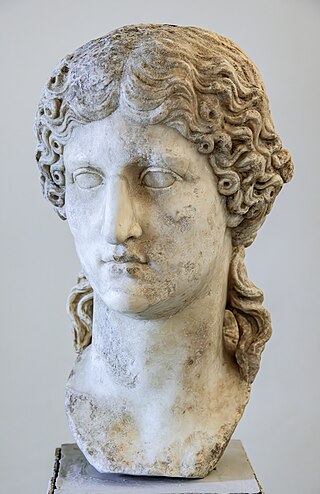
(Vipsania) Agrippina the Elder was a prominent member of the Julio-Claudian dynasty. She was the daughter of Marcus Vipsanius Agrippa and Augustus' daughter, Julia the Elder. Her brothers Lucius and Gaius Caesar were the adoptive sons of Augustus, and were his heirs until their deaths in AD 2 and 4, respectively. Following their deaths, her second cousin Germanicus was made the adoptive son of Tiberius, Augustus' stepson, as part of the succession scheme in the adoptions of AD 4. As a result of the adoption, Agrippina was wed to Germanicus in order to bring him closer to the Julian family.

Julia Agrippina, also referred to as Agrippina the Younger, was Roman empress from AD 49 to 54, the fourth wife and niece of emperor Claudius, and the mother of Nero.

Tiberius Claudius Caesar Augustus Germanicus or Claudius was a Roman emperor, ruling from AD 41 to 54. A member of the Julio-Claudian dynasty, Claudius was born to Drusus and Antonia Minor at Lugdunum in Roman Gaul, where his father was stationed as a military legate. He was the first Roman emperor to be born outside Italy.

Gaius Caesar Augustus Germanicus or Gaius, better known by his nickname Caligula, was Roman emperor from AD 37 until his assassination in AD 41. He was the son of the Roman general Germanicus and Augustus' granddaughter Agrippina the Elder, members of the first ruling family of the Roman Empire. He was born two years before Tiberius was made emperor. Gaius accompanied his father, mother and siblings on campaign in Germania, at little more than four or five years old. He had been named after Gaius Julius Caesar, but his father's soldiers affectionately nicknamed him "Caligula".
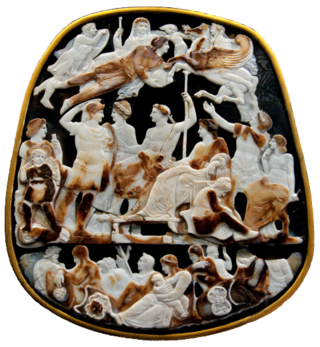
The Julio-Claudian dynasty comprised the first five Roman emperors: Augustus, Tiberius, Caligula, Claudius, and Nero.

Around the start of the Common Era, the family trees of the gens Julia and the gens Claudia became intertwined into the Julio-Claudian family tree as a result of marriages and adoptions.

Tiberius Julius Caesar Augustus born Tiberius Claudius Nero was Roman emperor from AD 14 until 37. He succeeded his stepfather Augustus, the first Roman emperor. Tiberius was born in Rome in 42 BC to Roman politician Tiberius Claudius Nero and his wife, Livia Drusilla. In 38 BC, Tiberius's mother divorced his father and married Augustus. Following the untimely deaths of Augustus's two grandsons and adopted heirs, Gaius and Lucius Caesar, Tiberius was designated Augustus's successor. Prior to this, Tiberius had proved himself an able diplomat, and one of the most successful Roman generals: his conquests of Pannonia, Dalmatia, Raetia, and (temporarily) parts of Germania laid the foundations for the empire's northern frontier.
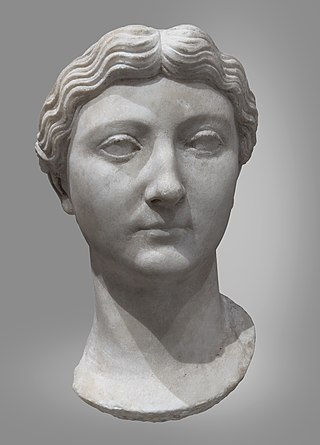
Livia Drusilla was Roman empress from 27 BC to AD 14 as the wife of emperor Augustus. She was known as Julia Augusta after her formal adoption into the Julian family in AD 14.
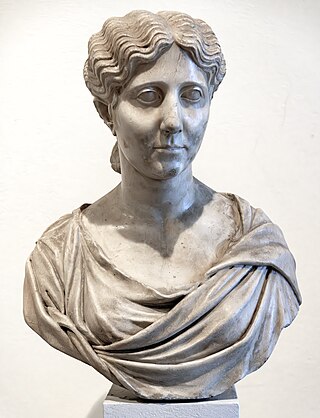
Antonia Minor was the younger of two surviving daughters of Mark Antony and Octavia Minor. She was a niece of the Emperor Augustus, sister-in-law of the Emperor Tiberius, paternal grandmother of the Emperor Caligula and Empress Agrippina the Younger, mother of the Emperor Claudius, and maternal great-grandmother of the Emperor Nero. She outlived her husband Drusus, her oldest son, her daughter, and several of her grandchildren.

I, Claudius is a historical novel by English writer Robert Graves, published in 1934. Written in the form of an autobiography of the Roman Emperor Claudius, it tells the history of the Julio-Claudian dynasty and the early years of the Roman Empire, from Julius Caesar's assassination in 44 BC to Caligula's assassination in AD 41. Though the narrative is largely fictionalized, most of the events depicted are drawn from historical accounts of the same time period by the Roman historians Suetonius and Tacitus.
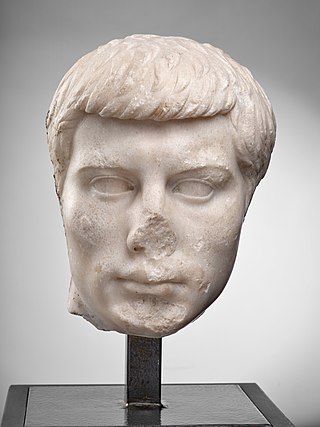
Tiberius Julius Caesar Nero, known as Tiberius Gemellus, was the son of Drusus and Livilla, the grandson of the Emperor Tiberius, and the cousin of the Emperor Caligula. Gemellus is a nickname meaning "the twin". His twin brother, Germanicus Gemellus, died as a young child in AD 23. His father and older cousins died, and are suspected by contemporary sources as having been systematically eliminated by the powerful praetorian prefect Sejanus. Their removal allowed Gemellus and Caligula to be named joint-heirs by Tiberius in 35, a decision that ultimately resulted in Caligula assuming power and having Gemellus killed in late 37 or early 38.

Drusus Caesar was the adopted grandson and heir of the Roman emperor Tiberius, alongside his brother Nero. Born into the prominent Julio-Claudian dynasty, Drusus was the son of Tiberius' general and heir, Germanicus. After the deaths of his father and of Tiberius' son, Drusus the Younger, Drusus and his brother Nero Caesar were adopted together by Tiberius in September AD 23. As a result of being heirs of the emperor, he and his brother enjoyed accelerated political careers.

Julia Drusilla was a member of the Roman imperial family, the second daughter and fifth child of Germanicus and Agrippina the Elder to survive infancy. She was the favorite sister of Emperor Caligula, who, after her death, had her deified under the name Diva Drusilla Panthea, and named his daughter Julia Drusilla after her.

Nero Julius Caesar was the adopted grandson and heir of the Roman emperor Tiberius, alongside his brother Drusus. Born into the prominent Julio-Claudian dynasty, Nero was the son of Tiberius' general and heir, Germanicus. After the deaths of his father and of Tiberius' son, Drusus the Younger, Nero and his brother Drusus were adopted together by Tiberius in September AD 23. As a result of being heirs of the emperor, he and his brother enjoyed accelerated political careers.
An agnomen, in the Roman naming convention, was a nickname, just as the cognomen had been initially. However, the cognomina eventually became family names, and so agnomina were needed to distinguish between similarly-named persons. However, as the agnomen was an additional and optional component in a Roman name, not all Romans had an agnomen.

Octavia the Younger was the elder sister of the first Roman emperor, Augustus, the half-sister of Octavia the Elder, and the fourth wife of Mark Antony. She was also the great-grandmother of the Emperor Caligula and Empress Agrippina the Younger, maternal grandmother of the Emperor Claudius, and paternal great-grandmother and maternal great-great-grandmother of the Emperor Nero.

The Julii Caesares were the most illustrious family of the patrician gens Julia. The family first appears in history during the Second Punic War, when Sextus Julius Caesar was praetor in Sicily. His son, Sextus Julius Caesar, obtained the consulship in 157 BC; but the most famous descendant of this stirps is Gaius Julius Caesar, a general who conquered Gaul and became the undisputed master of Rome following the Civil War. Having been granted dictatorial power by the Roman Senate and instituting a number of political and social reforms, he was assassinated in 44 BC. After overcoming several rivals, Caesar's adopted son and heir, Gaius Julius Caesar Octavianus, was proclaimed Augustus by the senate, inaugurating what became the Julio-Claudian line of Roman emperors.

De vita Caesarum, commonly known as The Twelve Caesars, is a set of twelve biographies of Julius Caesar and the first 11 emperors of the Roman Empire written by Gaius Suetonius Tranquillus. The subjects consist of: Julius Caesar, Augustus, Tiberius, Caligula, Claudius, Nero, Galba, Otho, Vitellius, Vespasian, Titus, Domitian.

The Caesars is a British television series produced by Granada Television for the ITV network in 1968. Made in black-and-white and written and produced by Philip Mackie, it covered dramatic territory similar to that of the later BBC adaptation of I, Claudius, dealing with the lives of the early emperors of Ancient Rome, but differed in its less sensationalist depictions of historical characters and their motives; in particular, the Emperor Tiberius is portrayed much more sympathetically.

Roman Empire is a television docudrama based on historical events of the Roman Empire. The show is in the anthology format with each season presenting an independent story. Season 1, "Reign of Blood", is a six-part story about Emperor Commodus. Jeremiah Murphy and Peter Sherman collaborated on writing the first season, with Richard Lopez directing. It premiered on Netflix on November 11, 2016. Season 2, "Master of Rome", premiered on July 27, 2018; it is a five-part story about the rise of Dictator Julius Caesar and the fall of the Roman Republic. Season 3, "The Mad Emperor", premiered on Netflix on April 5, 2019, and is a four-part story about Emperor Caligula.